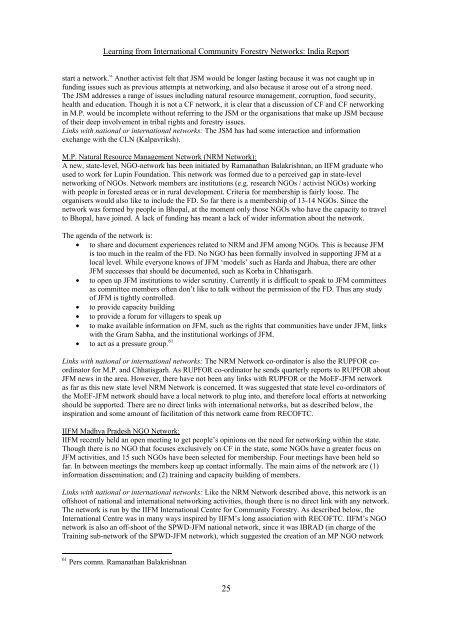Snapshots of International Community Forestry Networks: Country ...
Snapshots of International Community Forestry Networks: Country ...
Snapshots of International Community Forestry Networks: Country ...
Create successful ePaper yourself
Turn your PDF publications into a flip-book with our unique Google optimized e-Paper software.
Learning from <strong>International</strong> <strong>Community</strong> <strong>Forestry</strong> <strong>Networks</strong>: India Report<br />
start a network.” Another activist felt that JSM would be longer lasting because it was not caught up in<br />
funding issues such as previous attempts at networking, and also because it arose out <strong>of</strong> a strong need.<br />
The JSM addresses a range <strong>of</strong> issues including natural resource management, corruption, food security,<br />
health and education. Though it is not a CF network, it is clear that a discussion <strong>of</strong> CF and CF networking<br />
in M.P. would be incomplete without referring to the JSM or the organisations that make up JSM because<br />
<strong>of</strong> their deep involvement in tribal rights and forestry issues.<br />
Links with national or international networks: The JSM has had some interaction and information<br />
exchange with the CLN (Kalpavriksh).<br />
M.P. Natural Resource Management Network (NRM Network):<br />
A new, state-level, NGO-network has been initiated by Ramanathan Balakrishnan, an IIFM graduate who<br />
used to work for Lupin Foundation. This network was formed due to a perceived gap in state-level<br />
networking <strong>of</strong> NGOs. Network members are institutions (e.g. research NGOs / activist NGOs) working<br />
with people in forested areas or in rural development. Criteria for membership is fairly loose. The<br />
organisers would also like to include the FD. So far there is a membership <strong>of</strong> 13-14 NGOs. Since the<br />
network was formed by people in Bhopal, at the moment only those NGOs who have the capacity to travel<br />
to Bhopal, have joined. A lack <strong>of</strong> funding has meant a lack <strong>of</strong> wider information about the network.<br />
The agenda <strong>of</strong> the network is:<br />
• to share and document experiences related to NRM and JFM among NGOs. This is because JFM<br />
is too much in the realm <strong>of</strong> the FD. No NGO has been formally involved in supporting JFM at a<br />
local level. While everyone knows <strong>of</strong> JFM ‘models’ such as Harda and Jhabua, there are other<br />
JFM successes that should be documented, such as Korba in Chhatisgarh.<br />
• to open up JFM institutions to wider scrutiny. Currently it is difficult to speak to JFM committees<br />
as committee members <strong>of</strong>ten don’t like to talk without the permission <strong>of</strong> the FD. Thus any study<br />
<strong>of</strong> JFM is tightly controlled.<br />
• to provide capacity building<br />
• to provide a forum for villagers to speak up<br />
• to make available information on JFM, such as the rights that communities have under JFM, links<br />
with the Gram Sabha, and the institutional workings <strong>of</strong> JFM.<br />
• to act as a pressure group. 61<br />
Links with national or international networks: The NRM Network co-ordinator is also the RUPFOR coordinator<br />
for M.P. and Chhatisgarh. As RUPFOR co-ordinator he sends quarterly reports to RUPFOR about<br />
JFM news in the area. However, there have not been any links with RUPFOR or the MoEF-JFM network<br />
as far as this new state level NRM Network is concerned. It was suggested that state level co-ordinators <strong>of</strong><br />
the MoEF-JFM network should have a local network to plug into, and therefore local efforts at networking<br />
should be supported. There are no direct links with international networks, but as described below, the<br />
inspiration and some amount <strong>of</strong> facilitation <strong>of</strong> this network came from RECOFTC.<br />
IIFM Madhya Pradesh NGO Network:<br />
IIFM recently held an open meeting to get people’s opinions on the need for networking within the state.<br />
Though there is no NGO that focuses exclusively on CF in the state, some NGOs have a greater focus on<br />
JFM activities, and 15 such NGOs have been selected for membership. Four meetings have been held so<br />
far. In between meetings the members keep up contact informally. The main aims <strong>of</strong> the network are (1)<br />
information dissemination; and (2) training and capacity building <strong>of</strong> members.<br />
Links with national or international networks: Like the NRM Network described above, this network is an<br />
<strong>of</strong>fshoot <strong>of</strong> national and international networking activities, though there is no direct link with any network.<br />
The network is run by the IIFM <strong>International</strong> Centre for <strong>Community</strong> <strong>Forestry</strong>. As described below, the<br />
<strong>International</strong> Centre was in many ways inspired by IIFM’s long association with RECOFTC. IIFM’s NGO<br />
network is also an <strong>of</strong>f-shoot <strong>of</strong> the SPWD-JFM national network, since it was IBRAD (in charge <strong>of</strong> the<br />
Training sub-network <strong>of</strong> the SPWD-JFM network), which suggested the creation <strong>of</strong> an MP NGO network<br />
61 Pers comm. Ramanathan Balakrishnan<br />
25

















![CynefinFramework final [Read-Only]](https://img.yumpu.com/19017304/1/190x135/cynefinframework-final-read-only.jpg?quality=85)